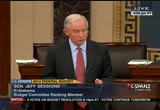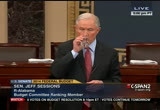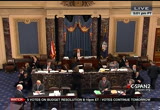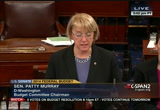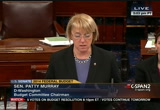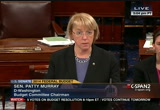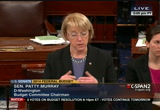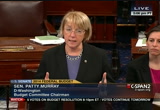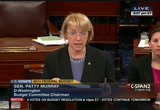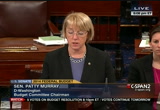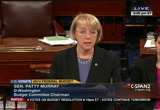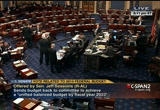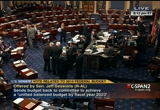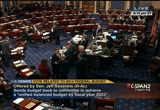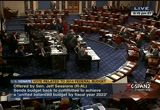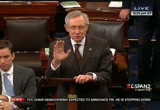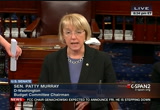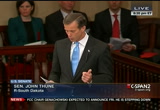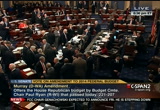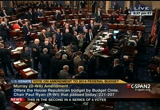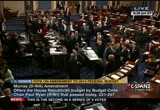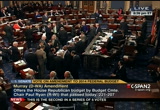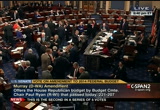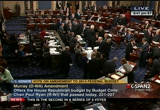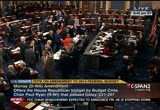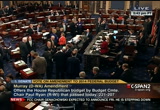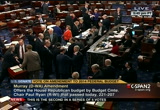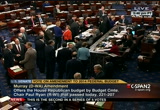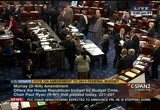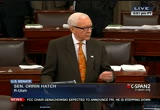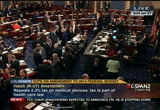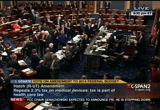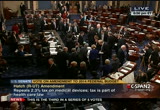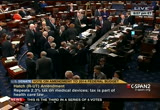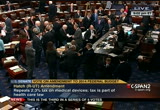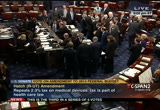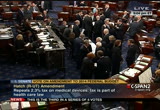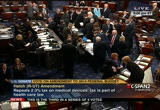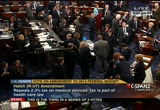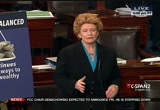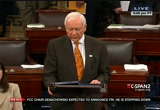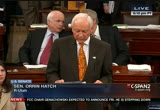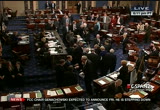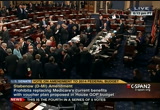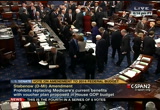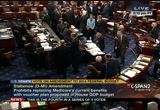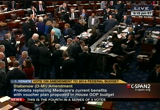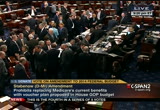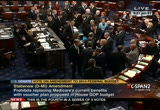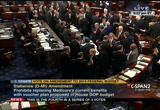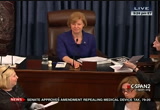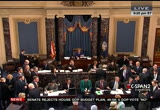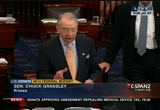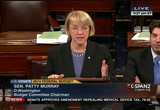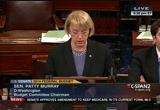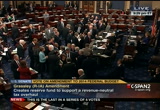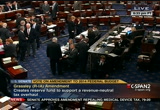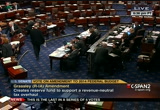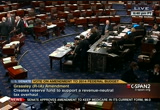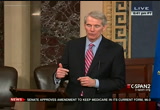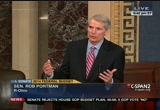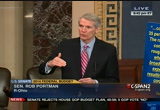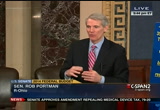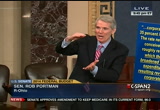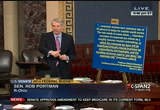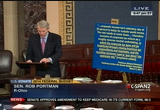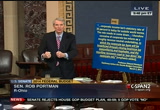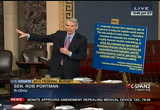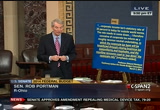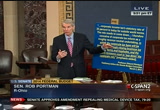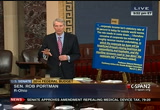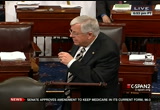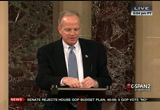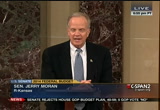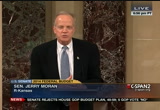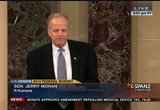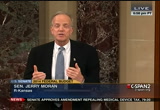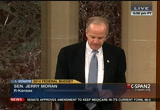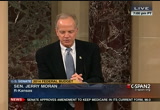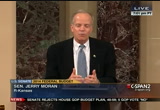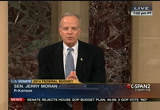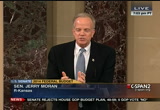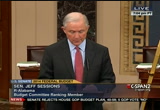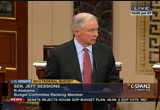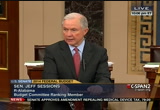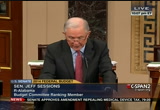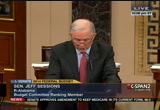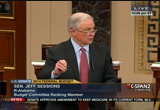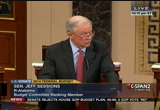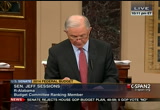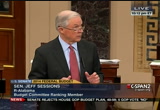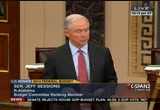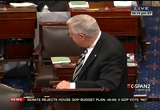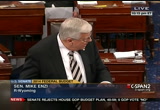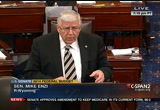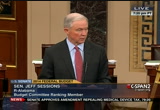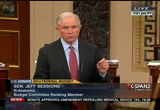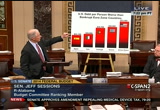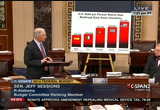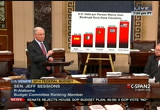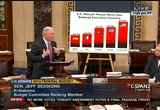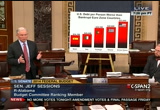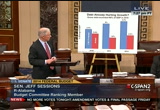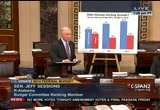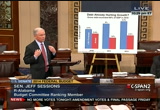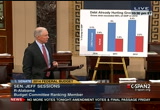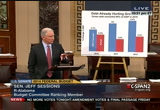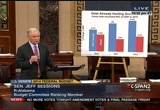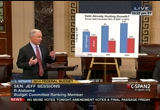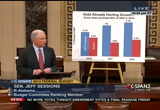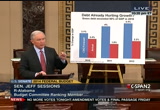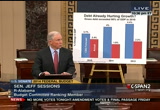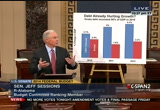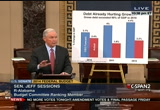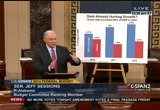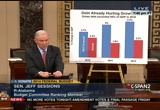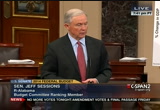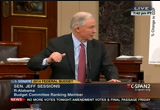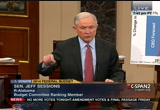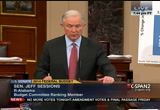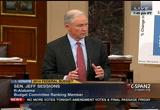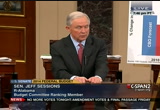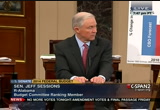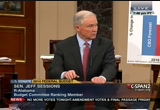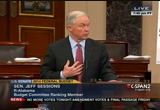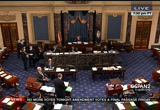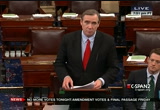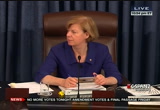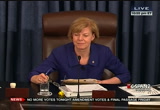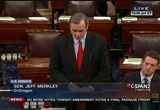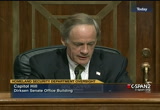tv Tonight From Washington CSPAN March 21, 2013 8:00pm-11:00pm EDT
8:00 pm
factor, the debt factor is the gross debt of the united states, is what they used in their study. this is confirmed, colleagues, by the international monetary fund, the european central bank and the bank for international settlements, all of which have done studies of developed nations with high debt. and they say it cuts growth. rogoff-reinhart says 1% to 2%. 1% reduction in growth amounts to a million jobs. for the last three years, our growth has substantial fallen below what c.b.o. projected. i believe the debt is already pulling down our growth. and i ask my colleagues one more thing: all of us have traveled our states. we've talked to our constituents. we've answered their questions. and they ask: are you going to do anything about the budget? are you going to balance the budget? why aren't you bringing up a budget? don't you, colleagues, say we
8:01 pm
should have a balanced budget? don't you say we should be moving toward a balanced budget, at least -- many of you, at least half of our democratic colleagues have said they favor a balanced budget constitutional amendment. and so we got this country on a right path. and you validated your promises back home. you should support moving this bill back to conference and letting the chairmen write a budget that balances that would make this economy much better. and i thank the chair and will yield the floor. the presiding officer: under the previous order, the clerk will report the amendments that are in order en bloc. the clerk: the senator from nevada, mr. reid, proposed amendments en bloc for mrs. murray, amendment number
8:02 pm
433 for mr. hatch amendment number 297, for ms. stabenow amendment number 432, for mr. grassley amendment number 156, for ms. mikulski amendment number 431, for ms. ayotte amendment number 158, for mr. cruz amendment number 202, for mrs. murray amendment numbered 439, for mr. crapo amendment numbered 222, for mrs. she haoepb amendment -- shihan amendment number 438. the presiding officer: the senator from washington. mrs. murray: mr. president, i want all of our members to understand that the second amendment that we will be voting on tonight is the ryan budget. there seems to be some resistance among my republican colleagues in bringing up the house republican budget for a vote, and it's pretty easy to see why that is. last year's house republican budget was in fact soundly rejected by the american people in the election. and since then it continues to be very clear. the american people prefer a
8:03 pm
balanced and fair approach that puts our economy and our middle class first. not an extreme irresponsible approach. unfortunately, house republicans put forward a budget last week that doubles down on the rejected ideology that the american people spoke about. and they have a new talking point about their same old budget. they now claim their budget would eliminate the deficit in 2023. and house budget committee chairman paul ryan has even said that it doesn't really matter how their budget eliminates the deficit. mr. president, americans across our country who will feel the impact of the choices we make in the coming weeks and months feel that it does matter. so while some of my republican colleagues would probably prefer not to hear about it, i think that the impact of the house republican budget is a crucial part of this debate, and we owe it to the american people to put our opinions on the record. now we've come a long way, mr. president, but there are still far too many americans
8:04 pm
today who are unemployed or underemployed, which is why our senate budget's first priority is boosting our economic recovery. speaker boehner has actually agreed with president obama that our debt does not present -- quote -- "an immediate crisis." so you might think the house budget would phase in cuts responsibly so we can protect our fragile recovery. well, instead the house republican budget would do serious damage to job creation and job growth and doubles down on the harmful cuts from sequestration which the nonpartisan congressional budget office estimates will lower employment by 750,000 jobs this year alone and slow our economic growth. mr. president, the house republican budget will weaken our economy in the long term as well. as any new business owner will tell you, in tight times the last thing you want to do is cut investments that help you make you stronger. that's what the house republican budget does.
8:05 pm
it cuts investments in education so our students and workers are less prepared for the jobs of the future. it would undermine our ability to upgrade our roads and bridges and highways and ports, even though our national infrastructure just got a d-plus from the american society of civil engineers. and the house budget would greatly reduce our ability to support research and development, making it so much harder for us to maintain the innovative edge that helps us attract new industries and new businesses to the united states. mr. president, americans want to see a budget that puts the middle class first and asks the wealthiest americans and biggest corporations to do their fair share too as we work towards deficit reduction. so our senate budget locks in tax cuts for the middle class while closing loopholes and cutting wasteful spending in the tax code. and our budget uses that new revenue from the wealthiest
8:06 pm
americans and big corporations for deficit reduction and for investments that support our economy and strengthen our middle class. now the house republican budget, which we'll vote on tonight, does the opposite. according to the tax policy center, the tax plan in the house republican budget would cost nearly $5.7 trillion in lost federal revenue. and the majority of that lost revenue will benefit the wealthiest americans. and just like past house republican budgets, it's once again pretty unclear how this budget would pay for all those tax cuts that are skewed toward the wealthiest. but the reality, mr. president, is that to achieve the goals that are laid out in their budget, house republicans will either have to add to the deficit, meaning their budget might not actually balance as they claim, or they're going to have to raise taxes on the middle class. according to the center on budget and policy priorities, to keep from increasing the deficit
8:07 pm
while lowering rates which they propose to do, the house budget would have to raise taxes by an average of $3,000 on families making less than $200,000 a year and have children. but in their plan the wealthiest americans will see a net tax cut averaging about $245,000. there is no reason why middle-class families should have to pay for a tax cut for the wealthiest americans. bad for our economy. very unfair. that kind of unbalanced approach is what made americans reject the house republican budget in the first place. the same is true of medicare. we just heard senator stabenow talk eloquently about the importance of medicare. while the house republican budget would replace the medicare guarantee with the voucher capped at growth levels below projected health care costs forcing our seniors to pay more and more out of pocket and ending medicare as we know it. that is not a solution that our
8:08 pm
seniors deserve. aarp said in their critique of the house republican budget -- and i quote -- "removing the medicare guarantee of affordable health care coverage, seniors have contributed to through a lifetime of hard work is not the answer." that's not me. that's aarp. the senate budget offers a much better answer. and, mr. president, let me remind everyone, in our budget we uphold the principle consistent with simpson-bowles and all other bipartisan deficit-reduction proposals that the most vulnerable families should not be asked to bear the burden of deficit reduction. our budget maintains the safety net that has kept millions of families and children above the poverty line during the recession and strongly supports efforts to help our low income students and others as they try to get back in the job market. mr. president, house republicans say their budget balances. nothing in it sounds like
8:09 pm
balance to me. and i'd like to remind my colleagues as this debate continues that unlike what house republicans have said about how a budget achieves its goals, how it achieves those goals really matters a lot. the american people have rejected this plan and understandably some of my colleagues across the aisle would prefer not to vote on it. mr. president, our senate budget offers a credible, serious approach to a fair and bipartisan agreement. it puts jobs and the economy first and provides a credible balanced path forward. mr. president, we're going to have to make some tough choices in the coming weeks and months, and i recognize moving away from the extreme approach in the house republican budget is going to be a tough choice for many of my republican colleagues. but i hope that as they consider the effects of the house republican budget on our economy and on our families throughout the country and the fact that
8:10 pm
the house republican approach has been thoroughly reviewed and rejected by the american people, that they will now be willing to come to the table, end the gridlock and dysfunction and discuss a fair, comprehensive budget deal. thank you, mr. president. i yield the floor and yield back my time. mr. sessions: mr. president? the presiding officer: the senator from alabama. mr. sessions: i would for the yeas and nays on the motion to recommit. the presiding officer: is there a sufficient second? there appears to be. the clerk will call the roll. quorum call: quorum callquorumvote:
8:33 pm
the presiding officer: is there any senator in the chamber who wishes to vote or change a vote? if not, the yeas 46, the nays 53. the motion is not agreed to. mr. reid: order for a brief minute, please. the presiding officer: the majority leader. can we have order for the majority leader. mr. reid: move to reconsider. lay that on the table. mr. president? the presiding officer: without objection. mr. reid: while we have everyone's attention, today, this evening and tomorrow we're going to have a lot of votes. everyone should understand you're not going to have time to spend a lot of time with your constituents, make phone calls. if the time is up, we're turning in, democrats and republicans. there are no excuses. we have a lot to do. we're going to try to get through these votes very
8:34 pm
quickly. we're going to terminate these votes very quickly. mrs. murray: mr. president? the presiding officer: the senator from washington. mrs. murray: mr. president, this next amendment is the ryan budget. mrs. boxer: the senate's not in order. the presiding officer: the senate will come to order. mrs. murray: mr. president, the next amendment is the ryan budget. republicans have doubled down on the failed policies by passing the same budget that was rejected by the american people just a few months ago. now senate republicans are going to have to decide whether or not they agree with this approach. mr. president, this budget would be devastating for the middle class and the economy. it would cause millions of workers to lose their jobs and dismantle programs like medicare that seniors and families depend on. it relies on gimmicks and tricks to eliminate the deficit by an arbitrary date and does all that while giving the wealthiest americans a tax cut. i encourage my colleagues to oppose this amendment. the presiding officer: who yields time?
8:35 pm
mr. coats: mr. president? the presiding officer: the senator from south dakota. mr. thune: mr. president, the house republican budget does something that the democrat budget does not do -- it balances. it actually balances in 10 years. and it does it not by taxing more but by spending less. spending at a slower rate, 3.4% over that 10-year period. if you look at what the house republican budget does, mr. president, it's focused on growing the economy, not growing the government. what the democrat budget here before the senate this evening does is it grows the government, not the economy. in fact, if you look at what the analysis that's been done, it's expected that the democrat budget would cost us 850,000 and reduce take-home pay for middle-class families by $1,500. the house republican budget takes serious the challenges facing this country, takes the steps that are necessary to save and protect medicare for future generations of americans, something that this budget, the senate democrat budget, does not
8:36 pm
do. i urge my colleagues to support this budget. it's a serious one that balances the budget in 10 years and puts our economy back in a growing mode and our fiscal house back in order. i yield the floor. omrs. murray budget raise: yawz. the presiding officer: is there a sufficient second? there appears to be. the clerk will call the roll. vote:
8:50 pm
8:51 pm
the amendment is not agreed to. mrs. murray: move to reconsider. mrs. boxer: lay it on the table. the presiding officer: without objection. under the previous order, there will now be two minutes of debathdebate equally divided ine ural form prior to a vote in relation to amendment 297, offered by mr. hatch. mr. hatch: mr. president, can we have order. mr. president? the presiding officer: the senator from utah. mr. hatch: mr. president, what we want to do is repeal the $30 billion costly medical device tax. it's a gross tax on these businesses. we've already lost 5,000 jobs and we'll lose 46,000 more. i ask unanimous consent that the balance of my rargs b remarks bd in the record and i hope everybody will vote for this. and i yield to my distinguished colleague from minnesota. ms. klobuchar: thank you very much, mr. president. the presiding officer: the senator from minnesota. ms. klobuchar: this is a bipartisan amendment, mr. president. this is about innovation and jobs. medical device industry is one
8:52 pm
of our biggest exporters. we have so many opportunities out there with a growing middle class in china and india to export even more. but we cannot have a tax that puts us out of competitive advantage. i think people understand that. this is about manufacturing, high-skilled jobs, millions of jobs in america. and i ask my colleagues to vote with senator hatch and me to repeal this tax. thank you, mr. president. the presiding officer: who yields time? the senator from utah. mr. hatch: i yield back the balance of my time and ask for the yeas and nays. sr. is there a sufficient-- the presiding officer: is there a sufficient second? there appears to be. the senator from washington. mrs. murray: i yield back all time and ask for the yeas and nays. the presiding officer: the yeas and nays are ordered. the clerk will call the roll. vote:
9:08 pm
to vote or change their vote? if not, the ayes are 79, the nays are 20. the amendment is agreed to. the senator from washington. mrs. murray: madam president, move to reconsider. lay it on the table. the presiding officer: without objection. mrs. murray: madam president? the presiding officer: under the previous order, there will now be two minutes of debate equally divided in the usual form prior to a vote in relation to amendment number 432, offered by ms. stabenow. mrs. murray: madam president? the presiding officer: the senator from washington. ms. stabenow: i yield my one minute to the senator from michigan. ms. stabenow: madam president? the presiding officer: the senate will be in order. ms. stabenow: madam president, this is a very simple, straightforward amendment. a "yes" vote supports medicare as an ongoing insurance plan. a "no" vote sides with what the house of representatives has done with the ryan republican
9:09 pm
budget. dismantling medicare, turning it into a voucher program, adding $6,000 on average costs to seniors, and to add insult to injury, their budget takes the money, doesn't strengthen medicare, gives another tax cut for the wealthiest americans averaging about $245,000 for those at the very, very top. please vote "yes." let seniors know in this country what they've paid into their entire lives be there for them and the great american success story of medicare will remain strong for the future. mr. hatch: madam president? the presiding officer: the senator from utah. mr. hatch: madam president, i rise today to set the record straight. amendment number 432, which characterizes the house budget plan as a plan to turn medicar medicare -- could i have order. the presiding officer: the senate will be in order. the senator from utah. mr. hatch: i rise -- i'll just say it again. i rise today to set the record straight. amendment number 432, which
9:10 pm
characterizes the house budget plan as a plan -- a senator: the senate's not in order. mrs. murray: madam president, the senator deserves to be heard. the senate's not in order. mr. hatch: thank you. the presiding officer: senators will please take their conversations out of the wells. the senator from hatc utah. mr. hatch: i thank my colleague. this characterize of the house bu plan is a plan to turn medicare into a -- quote -- "voucher" program is plantly t the -- is patently false. the fact of the matter is this amendment is -- is trying to voucherrize medicare and it's just not true. i think it very ironic that my colleagues on the other side of the aisle attack the house budget proposal when the affordable care act took $716 billion from the bankrupt medicare program to create an unsustainable new entitlement. in no way can the house budget be considered as turning medicare into a voucher program. and we reject amendment 432's
9:11 pm
characterization. now, the house budget proposal draws from bipartisan proposals put forth by the breaux-thomas medicare commission presiden, pt bill clinton and alice rivlin. we'll be happy to take the amendment by unanimous consent. the presiding officer: the senator's time has expired. mrs. murray: madam president, i ask for the yeas and nays. the presiding officer: is there a sufficient second? there appears to be. mr. hatch: madam president? madam president? the presiding officer: the question is on amendment 432. the clerk will call the roll. vote:
9:24 pm
9:25 pm
the senator from washington. without objection. under the previous order, there will be two minutes of debate equally divided in the usual form prior to a vote in relation to amendment 156 offered by mr. grassley. the senate will be in order. senators will take their confirmations out of the well. who yields time? mr. grassley: madam president? the presiding officer: the senator from iowa. mr. grassley: this amendment strikes a $975 billion reconciliation tax increase. this amendment in turn sets up a deficit-neutral reserve fund allowing the finance committee
9:26 pm
to reform -- reform -- corporate and individual taxes in a revenue-neutral way. the president got his $612 billion tax increase january 1. we should not raise taxes another $1 trillion with unemployment at.%. -- at 7.7%. we should not close more loopholes for more spending. only close loopholes for tax reform. we want to grow the economy by raising -- we won't grow the economy by raising taxes by $1 trillion like the majority wants to do. we'll grow the economy with more efficient pro-growth tax reform. my amendment is pro-growth, pro-small business, pro-jobs much the democrat budget taxes middle class to spend more. it is balanced and fair because it finally comes to the conclusion, you can't raise taxes just on the wealthy. you have to raise it on the middle class.
9:27 pm
the presiding officer: the senator's time has expired. mrs. murray: madam president? the presiding officer: the senate will be in order. mrs. murray: madam president? the presiding officer: the senator from washington. mrs. boxer: the senate's not in order. the presiding officer: the senate will be in order. mrs. murray: madam president, again, the goal of our budget is to tackle our testify sit and debt responsibly in a way that works for middle class and the economy. that means a balanced mix of responsible spending cuts and new revenue from those who can afford it the most. madam president, all of the bipartisan groups that have examined our budget situation have acknowledged this reality. simpson-bowles, gang of six, domenici-rivlin all recommended more revenue than the roughly $600 billion that we generated in the year-end deal. in fact, simpson-bowles and the gang of six each recommended well over $2 trillion in new
9:28 pm
revenue, several times more than the year-end deal. so repealing this budget's proposed revenue increase and striking the reconciliation instruction would be wholly irresponsible. we cannot cut our way out of this problem. thank you, madam president. and i urge our colleagues to vote "no." and for the information of all senators, this is the last vote this evening. tomorrow there are votes beginning at 11:00. i would ask again that all senators be here. we're going to be moving through a lot of amendments tomorrow. i have a lot of senators asking me to have their vote be -- their amendment be voted on. i assure you that at 1:00, 2:00 in the morning tomorrow night, many of you won't have that opportunity unless you're here and help move this process along. so, madam president, i yield the floor and i ask for a "no" vote. ask for the yeas and nays. the presiding officer: is there a sufficient second? there appears to be. the clerk will call the roll.
9:41 pm
his or her vote? if not, the ayes are 45, the nays are 54. the amendment is not agreed to. a senator: move to reconsider and to lay it on the table. the presiding officer: without objection. a senator: madam president? the presiding officer: the senator from ohio. a senator: madam president, we've had a great debate here on the floor today about the budget. mr. portman: and what we've heard is the fact that in the face of unprecedented debt and deficits, we need to get spending under control and grow the economy. unfortunately the democrat budget that's been presented doesn't do that because it actually increases spending, increases taxes. but there is an alternative and that is to restrain spending in ways that are smart but also get in economy moving so we have more revenue. and revenue the way we ought to get it, which is through growth. one obvious way to do that is through tax reform.
9:42 pm
we just had a vote on a tax reform proposal. i'm offering a couple of amendments that i'd like to talk about tonight. one is with regard to tax reform on the business side, which is one where there is an amazing consensus now between democrats, republicans, the white house and the capitol on how to get this economy moving again by ensuring that our tax code becomes more competitive globally. not to cut taxes, not to raise taxes but in a revenue-neutral way, to improve the way we collect taxes at the business level to be sure we can create more jobs here at a time when we're suffering through the worst recovery we've had since the great depression. second, i'm going to offer an amendment that ensures that we have the right information from the congressional budget office and the joint committee on tax, which are the two groups that give us information here on capitol hill, as to what tax reform means. because we want to be sure that as we reform our tax code, we do it in a way that's pro-growth and pro-jobs. fundamental tax reform should be done across the board, in my view, not just on the business side but also on the individual
9:43 pm
side. on the individual side, we have a great opportunity to broaden the base of tax, lower the rates to make the code again more pro-growth. most businesses in america pay their taxes through the individual tax code because they are what's called pass-through entities. about 85% of businesses. they tend to be smaller businesses. that's very important. but tonight i'm going to talk about the other part of that, which is the business tax code that relates to primarily our larger companies and a lot of the international companies, the so-called "c" corporations. back in 1986, we actually reduced the rate on the corporate side from 46% down to 34%. that was 1986. it was done in a bipartisan way. with ronald reagan and tip o'neill. and the idea at that time was to take our tax rate down to the point where it was competitive, meaning it was below the average of our global competitors. in the intervening 2 1/2 decad decades, guess what's happened? every single country of the
9:44 pm
developed world, the so-called oecd countries, our global trading competitors, every single one of them have gone in and reform theied their tax cod. they've lowered their rates but they've also made their code more competitive. every single country except us. so america's been on the sidelines while other countries have moved quickly to improve their tax code. why? because they want investment, they want the jobs. and what's happened is, sure enough, they're more competitive, capital is now flowing outside of this country, we're losing headquarters, we're in a situation where if there's a foreign acquisition to be made, those companies in foreign countries have an advantage because they have a more competitive tax code. our tax rate, which in 1986 was purposely put in place to be just below the average of all the developed economies in the world, is now number one. it's the highest rate in the world. that's a number one you don't want to have. japan just lowered their rate last year, putting america as the top corporate tax rate in the world.
9:45 pm
this means, again, we're losing people, we're losing capital, we're losing headquarters. we can't keep up. so what's the solution? well, let's go do what we did back in 1986 again and deletes it quickly and let's do it on a bipartisan basis, because everybody seems to agree that our current code is not competitive, that the rate is too high. we have some disagreements on how to correct it. but actually, there's a growing consensus about that as well. the white house has talked about this. in fact in a february 2012 white paper issued by the treasury department they said, let's lower the rate of corporate taxation by broadening the base, getting rid of a lot of preferences that have built up in the tax code. hundreds of them have been built up since 1986. so not only has our rate become high because other countries have lowered there, we've added mured anmore and more indicatior -- complications to our tax code. a professor came to talk to us
9:46 pm
in the budget committee who was the democrat witness. this wasn't the republican witness who was gung ho also on doing corporate tax reform. this is what he said. "corporate income tax's statutory rate of 35% is far outside world norms. utah rate needs to come down. i therefore conceive of corporate tax reform pass roughly revenue neutral in which the corporate tax base will be broadened through closing business tax expenditures and loopholes, and the resulting revenues used to pay down the corporate rate." they said we should reinvest the savings you get from getting rid of some of these loopholes and expenditures and use it to invest in lowering the rate. so here we have an opportunity as a congress, republicans democrats alike, to do something that's good for jobs. by the way, the congressional budget office has looked at this in terms of who benefits. it is not the corporate boardroom. it is the workers. 70% of lowering the rate rat ras
9:47 pm
going to go to workers in the form of higher salaries, higher benefits and more jobs. by the way, the congressional budget office has also said if you'd like to get the economy moving, probably the best bang is to do something on the corporate tax code because it has gotten so complex and the rate has gotten so high. if you do this you're also doing something we ought to be doing generally in our tax code, which is you are picking wishes and losers. instead of the government sneaping and deciding where resources are allocate, you have market forces doing that, which is going to help grow the economy. just as president reagan and democrats did in 1986, we should cap or eliminate inefficient tax preferences and loopholes. we should use that ref true knew to reduce -- that revenue to reduce both the corporate rate and individual rate. another amendment of mine takes this same idea, which is tax reform on the individual-corporate side, and allows us as legislators to understand better what we're doing.
9:48 pm
right now when the congressional budget office and the joint committee on taxation give us an analysis of taxes, they tell us what the revenue is likely to be based on what they call a static score. it doesn't rea really take into account the big macroecomonic changes you're likely to see what people's changed behavior from lower rates, for instance. back in 2003 the capital gains tax as you know was reduced and so what did they say? the joint committee on taxation and c.b.o. said that means because you've lowered the rate of taxation that you're going to get less revenue, right, because you have less taxes coming in? no, because they lowered the revenue, there was more economic activity. we got more revenue in. and so in 2007 they said revenues were is going to go down. revenues shot up. the same thing happened by the way back in 199, the last time this congress had a unified,
9:49 pm
balanced budget when bill clinton was president and he worked with the republican congress to get some of the spending under control, as we talked about earlier, but also they cut the capital gains rate and lowe an lo and behold, lotsy showed up on the revenue side. the dynamic score, the macroecomonic scoring showed that was going to happen but the static score didn't. so as we begin to form yo formut kind of scoring we should do, wouldn't it be great if we had access to two kinds of analysis: the static score, nothing changes there. but also why shouldn't we have access to the macroecomonic analysis? not done from the outside, not groups on the outside that might have a pretty aggressive dynamic score. but let's use the macroecomonic model that the joint tax committee already does. they're required to look at it in three different ways.
9:50 pm
c.b.o. already does. it doesn't add more work in the sense that this analysis is being done. it is just that we aren't getting the benefit of it. this second amendment that i hope my colleagues can also support, as i hope they will the first one, says quite simply, let's have more information so we can make smarter decisions. the who can be against that? some have said, we don't believe in dynamic scoring. fine. if you don't, let's see what happens. we're going to have a static score, then we'll have the dynamic score and again we want that so we can formulate a better tax reform proposal but also to know what the impact will be and we'll see what happens. my belief is that the macroecomonic score is more likely to be accurate, as has been in the pastes and over time i wouldn't be surprise fundamental this congress decides, my gosh, that's more consistent with the behavior changes you'll see with good tax reform. let's make that part of the official analysis. but that's not what we're talking about here tonight much the official score would still be the static score.
9:51 pm
i believe this will enable us to be better legislators and certainly will enable us to have an opportunity as we look at this budget deficit and these historic debts and impact it's having on our kids and grandkids and on today's economy to come together as republicans and democrats and do the two things everybody knows has to be done cloosh one, restrain spending. remember, this c.b.o. has told us in their report just about two weeks ago that the growth of medicare, medicaid, and social security incredibly important programs -- that's why we need to save them -- that growth about go up by 94% over the next ten years. it nearly doubles. as a percent of the economy, which is how they look at the spending, as a percent of the economy, the only growth in our spending over the next ten years is going to be from these entitlement programs and interest on the debt. other parts of our budget actually, as a percent of the
9:52 pm
economics are going to be flat, or even a little bit below the percent of the g.d.p. but what's going to grow dramatically are these programs. so we know we have to have entitlement reform to save these programs so the trust funds don't go insome o insolvent, why otherwise do. but we should also do tax reform. those two together, entitlement reforms, smart retorse to make the programs work together, and then tax reform that is pro-growth, that's going to generate ref to help us -- generate nevada knew to help us, because they have change people's behavior which will change economic growth, which will in turn provide more revenue, revenue really the right way will help us get the debt and deficit under control and at the same time give people the opportunity to get back to work, deal with this weakest economic recovery since the great depression, help us to get out of the dull dropples we're in in this -- the dull drums we're in -- the doldrums we're
9:53 pm
in. the congressional budget office and the joint committee on taxation will enable us to manufacture this forward in ways that can be bipartisan, in ways that can be consistent with what the administration and the congress is talking about restraining spending, growing the economy. so, madam president, thanks for letting me talk about this tonight. i look forward to having these amendments offered tomorrow. i hope that my colleagues on both sides of the aisle will be willing to stand doth and to say, yeah, we can do this. we can get this economy moving. we're going to have to change the i would we deal with our tax system. we're going to have to row statement be spending. if we do that our future can be brighter. i yield back my tievmen time. mr. enzi: madam president, i just want to thank the senator from eowe fofrom ohio for his uy clear way of explaining things. i know that comes from the tremendous background that he has had not just in the hours but actually -- not just in the house but actually putting together a white house budget before.
9:54 pm
i guess you've had access to these different sources of information before and now how they could work if we could get access to them. and it's hard for me to believe that somebody wouldn't want more information. they can analyze themselves whether they think that it's useful or not, but more information is always better. and so i really thank you for bringing that amendment here and your other a.m. as well. -- and your other amendment as well. so that one is just incredible, that anyone would oppose it. thank you for the great presentation you did. mr. portman: thank you, sir. the presiding officer: the senator from kansas. mr. moran: madam president, thank you. i have filed an amendment number 233 that i'd like to visit with my colleagues about this evening. i'm pleased that we're debating a budget. budgets have great purse in individual and -- great purposes
9:55 pm
in individual and business lives and they're important to us as we try to solve the country's fiscal problems. a budget is a document that determines how much money we have to spend and how we're going to spend it. and in determining how we're going to spend money, we establish priorities. and i want to talk about one of my priorities for the investment of our taxpayer dollars. kansans and citizens from across the country pay their taxes, and in many ways they would be pleased by those having to pay taxes if they knew that the money was being well-spent. and one of the areas that i strongly believe that we can prioritize and that money can be well-spent is in support of the national institute for health. we have a tremendous opportunity in this country to continue to lead in the world's research to solve individuals' problems with
9:56 pm
their health, with the treatment of disease, in eradicating disease and treating the consequences of the people of our country and rulely the people of our -- and really the people of our world. that this amendment that i will -- that i'm going to discuss adds $1.4 billion in spending for the national institutes of health. and our citizens and our country face a significant challenge. there's not a family in our nation that's not been -- has not suffered from the consequences of cancer and other horrendous diseases. and we've seen tremendous success. america leads the world in finding cures and treatments for those diseases. a problem is that the funding for n.i.h. ha has remained as a virtual standstill since 2010.
9:57 pm
and, in my view, those who come to congress with the desire to make sure that every dime, every nickel is wisely spent, and those who come to the congress with the belief that we need to care for people and provide compassion to all can come together and jointly agree that money spent on the national institutes of health is both that; it's a sense of providing well-being, comfort, care, and treatment for people who desperately need that, and it's the realization that when we invest in research, in projects that ultimately cure a disease, that we are saving money. we save money by curing and treating diseases which then means that the cost of health care is reduced. long before congress passed a so-called health care reform
9:58 pm
bill, i outlined to my constituents in kansas what we could do to save health care costs. and one of the points in my plan was to invest in medical research. because money invested today in research saves lives and reduces costs. there's also the reality that the united states of america is the place to do research, but we're facing tremendous challenges because of the fla flatline of n.i.h. spending and the lack of real dollars available for medical research. and in fact we have to worry that there is a brain drain once again going on in the united states. other countries are investing. other countries with more difficult economic challenges than ours are increasing their funding for medical research. and i've always worried that if we don't compete, if we don't maintain a steady opportunity
9:59 pm
for research scientists in the united states, that we will lose the edge and the economic and health benefits that come from having that edge in a global economy. our own director of the n.i.h., frances collins, highly regarded, with tremendous background, intellect, has indicated that we're seeing the potential for a brain drain. and he says this. this is what he said in february of this year, just last month: "since 2003, the n.i.h. budget has basically lost about 20% of its purchasing power by effectively flat budgets that have been eroded by inflation. the consequence of that is to guarantee -- to send us the best and brightest in hopes f being supported is that their chances of being funded has dropped from about one in three, which it has been at that point for the last
10:00 pm
50 years, now to one in six." imagine yourself as a young investigator, a scientist, with a great idea, ready to tackle it and to do so in your university setting somewhere in the united states, knowing that you only have a one in six chance of getting funding. seeing that there seems to be no greater clear path forward in support of biomedical research, wondering if you can legitimately speak to young people who are wanting to follow your path, about whether this is one path they should choose, dr. collins says, "this deeply worries me." so at a time when we need to be encouraging our children to pursue careers in science and education and research, for biomedical research, we clearly send a message that this may not be the career you want to pursue
10:01 pm
and, at the same time, as other countries increase their support for biomedical research, we send a message that maybe even though you decide you want to pursue this career, maybe you should pursue it someplace else. this is a serious problem that desperately needs our attention. and so i'm going to ask my colleagues to support an amendment that establishes a clear understanding of the value of biomedical research, of both, again, that opportunity to increase the longevity of our lives, to improve the quality of our lives, to combat those diseases that are so devastating to so many families in our country, knowing that when we do that, not only are we improving individual lives, the well-being of families across our nation, but we are also investing in an opportunity to reduce the long-term cost of health care in the united states. now, madam president, this issue
10:02 pm
is one of great importance to me, and i can't imagine there's a senator in our chamber who hasn't experienced the challenges of disease and death in their own families. and we've seen tremendous strides in turning this around. and it is so clear to me that we need to make certain that those strides continue. and i was pleased to have the gentleman, the senator from illinois seek me out on the house of the senate floor this evening to suggest there is an opportunity for us to work together. and so while i have an amendment filed, senator durbin and i are having a conversation tonight, tomorrow to see if there is a way that we can come together in a joint amendment to fully establish that all of us are in favor of funding the n.i.h., the
10:03 pm
national institutes of health, at a phag magnitude, at a levelt will again restore us at the forefront of medical research around the globe, will send the message to our students and future scientists that america is the place that medical research should occur and where they should pursue their careers, and that disease can be conquered and that lives can be restored and, most importantly, that hope can be had in the united states, that the serious and debilitating diseases, the causes of death that so many families face day after day, year after year can be cured and treated. madam president, i look forward to those conversations with my colleagues to see that we find the right words to bring us together to demonstrate significant and real support for funding the national institutes of health.
10:04 pm
and i yield my time. mr. sessions: madam president? the presiding officer: the senator from alabama. mr. sessions: are we in business or is there a quorum call? the presiding officer: the senate is not in a quorum call. mr. sessions: all right. thank you so much. madam president, there is a lot of problems, i think, with our country and the way we manage business. i think, frankly, president bush got engaged in a war that used
10:05 pm
up so much of his time and effort. president obama is not trained as a manager. he's never been a manager, not been a governor or managed a business and has too little tough, serious management of the taxpayers' money in this country. and it's time for us to get under control the spending that goes on here. and in my humble opinion, the american people are tired of sending more money to washington because we run out. and we say it's not our fault. it's just the way things are. we can't have any reduction in spending. children and the people that are hurt and painful, hungry, women, the elderly, singles, marrieds, whatever, they've got to have more money. and any change in our policy whatsoever means that somebody
10:06 pm
is not getting something they're entitled to. well, the truth is many of our programs serve many good people in need, but almost all of those problems have serious management problems that they could be run effectively and eif i recollectly, and -- efficiently and the program would cost substantially less without any significant diminishment of the effective aid that's rendered by that program. i believe the american people understand that absolutely and fully. but if we don't, so an amendment or idea comes forward to confront a wasteful spending, somebody in this body, particularly in the senate, always objects, and they raise the specter of meanness and unkindness and that sort of thing when in truth we all ought
10:07 pm
to identify serious problems and fix them. for example, in our energy policy, we've had some of the most amazing failures and losses of federal money that i can imagine beyond anything that's logical and absolutely should not have happened. most people have heard of the solyndra company. they had political connections to the white house and received $528 million in federal loans. and then went bankrupt; left uncle sam holding the bag. and then there was another company -- abound solar -- it declared bankruptcy after receiving $400 million in federal loan guarantees, failing to deliver on the promises that they made, somebody at the department of energy apparently
10:08 pm
was not checking very well, and maybe they were more interested in a press release, in a big announcement and going to some solar factory and saying how we're going to create jobs and grow the economy and pumping hundreds of millions of dollars in the programs that sink. and beacon power received $43 million in a federal loan before it shut down. fisker, an electric carmaker, is not making any cars now due to production problems. it received more than $190 million from the energy department. a battery maker, a-123 systems, also received substantial federal loans. it's bankrupt. the president emulates failing energy programs in europe. his policies were designed to
10:09 pm
promote a policy -- energy theory that's not really ready economically. it's one thing to invest in research to try to create a new battery. it's another thing to try to loan hundreds of millions of dollars to a company to produce a product that's not competitive and not ready for prime time. that's a mistake that we made. mr. lawnborg from europe who wrote the book "cool it" and is an expert, i think, on these issues pointed out a number of years ago in his book that the best way to handle this is for the government to subsidize where it can and direct money to try to reach technological breakthroughs but you should not mandate the people of the united states use any kind of program that won't work, that's going to cost them a lot more money and
10:10 pm
have little benefit on the environment. back in 2008, president obama made this statement: "will america watch as clean energy jobs and industry of the future flourish in countries like spain, japan, and germany?" that's what he said. we need to emulate spain, japan and germany. but spain right now is having to cut back dramatically on its really forward-leaning green mandates. they went probably further or as far as any country in europe. it's been a total disappointment. they are reducing their subsidies. their economy is in shambles, and they're not doing well. "the financial times," just february of this year wrote this -- quote -- "the spanish government's latest bid to cut its growing debts to the
10:11 pm
country's energy sector is expected to slash profits at renewable energy companies asthma tkreud continues to -- as madrid continues to grapple with a $37 billion deficit built up through the years of subsidies." they go on to say "in akiona, spain's second largest wind power operator, shares in that company have tumbled almost 20% with analysts expect their earnings per share to drop by 40% while abagoa's earnings per share are forecast to drop by 12%." and germany is also cutting back. according to reuters, in january of this year -- quote -- "the german energy company, r.w.e., is delaying investments. siag filed for insolvency. repower systems is cutting temporary staff. all show how german chancellor
10:12 pm
angela merkel's $734 billion plan to replace nuclear reactors with renewable sources is stalling." former secretary of treasury under president obama, larry summers, said this -- quote -- "government is a crappy venture capitalist." that is exactly correct. we have no business trying to pick and throw american taxpayers' money into risky adventures. we are not good at it. spain and germany are not good at it. governments just aren't. but when it's your money and you're putting up $100 million, then you are at a point where you need to be very serious about that investment. madam president, i think these are some points i wanted to make
10:13 pm
because i think the american people are just tired of hearing washington say send more money. no, we're not going to cut spending in washington. we can't do that in -- and the budget that's on the floor now does not cut spending, does not reduce the deficit. it increases spending. it increases the deficit. it increases taxes by $1 trillion. what did they say in the budget? we're not going to cut spending here. there's nothing we can cut. the government's working. every dollar we get, every dollar we distribute is absolutely critical, cannot be contained. send more money. just send more money and don't complain, american people. i think the people are getting tired of that. they have a right to be tired of that. they should not send another dime here until we're on the right path. i see my friend, senator enzi, and i would be pleased to yield
10:14 pm
the floor, and would note that senator enzi is a senior member of the budget committee, is a successful businessman who has a proven record in his state. he understands these issues and he's trained as an accountant. and i'm sure when he sees what we do in the budget process around here, he must wonder what world we're connected to. i thank the chair and would yield the floor. mr. enzi: madam president? the presiding officer: the senator from wyoming. mr. enzi: i want to thank the senator from alabama for all of the work that he's done on the budget. he's worked on a budget for two years previous to this that never materialized. and so i'm so pleased that he's finally getting to -- he and his staff are getting to work a
10:15 pm
budget. and i understand his disappointment. i am an accountant, and i hope that senator johnson, who is the other accountant in the united states senate, will have an opportunity to come to the floor and talk about some of the numbers, because there seem to be some discrepancies on the numbers. he's tried to pin those down by asking questions of the staff. as a result has come up with some demonstrations that show where the budget that we're currently talking about goes. but i wanted to just briefly share an article that i ran across today. it's called "mr. penny versus the dragon." hey, kids, it's the national debt. our kids across america can understand the debt. we're having a lot of problems understanding it in this body. but washington's budget squabbles and financial fights are enough to tangle up anyone's heads. so one can only imagine how it
10:16 pm
might confuse children. so enter mr. penny and the dragon of domeville. let's see, that would be the dome? yes. this children's book by lucille mcconnell seeks to raise awareness of fiscal irresponsibility and the national debt for those who are just out diapers. the book's hero, mr. penny, is introduced as quite an individual and not a follower. it begins once upon a penny in the land of us. that would be u-s. in the little town of me-ville lived a little penny. in fact a whole lot of little pennies were scattered all over the land of us. but our story is about one particular penny, mr. penny. he was a singular fellow, quite an individual and not a follower of the crowd. the antagonist, a dragon, a black dragon -- if this would
10:17 pm
have been a western story, it would have been a guy with a black hat -- a dragon designed to represent a bloated federal government that won't stop growing and loves to eat currency. in fact, he developed a taste for charred bills, dollar bills. within no time, the dragon had devoured $15 trillion. you can tell the book's a little bit old, otherwise it would be $16.6 trillion -- that's where we are now -- and was always looking around for more to consume. eventually, mr. penny scores a one-on-one with the dragon and does his level best to convince the dragon just how -- how reckless federal spending can be. i don't think you know what effect you're having on the whole land of us. by eating the money that we send to domeville. our schools are closing, our youngsters can't go to college, our oldsters can't get medical help, there's month money for loans for businesses, our roads and bridges are falling down, our towns and cities are not safe, our citizens do not have jobs and we are running out of
10:18 pm
money. on the book's web site, mcconnell describes herself as a tax commercial transactions attorney practicing in washington and new york and says -- and this is very important -- all funds from the book -- all funds from the book will go toward paying down the national debt. in an author's note in the book, mcconnell writes, "our beloved country is in trouble, big trouble. this is the kind of trouble that cannot be solved unless we all pitch in and come to the aid of our country immediately." she adds, "my hope is after reading this book, young people are energized about the possibility of what we can accomplish together through cooperation and teamwork." so i had an amendment in the committee that would have taken care of some of those charred bills and converted them to metal coins, dollar coins. if we were to do that, it would probably save about a billion dollars.
10:19 pm
that maybe not -- doesn't sound like much around here but a billion would be a good start and would put a little punctuation in this -- in this book. we are getting to the point where if we don't do something, we won't have money to spend. if the interest rates go up and if people lose confidence in our economy, the interest rates will go up. and the only thing we'll be able to pay is interest. doesn't that sound like somebody that's used their credit card too much and can't afford to pay the credit card down? of course, we're not even worried about paying the credit card down. we're not even talking about doing that. we're not even talking about balancing the budget at this point. and we need to do that. or maybe we need to pass out copies of mr. penny and the dragon of domeville. i yield the floor.
10:20 pm
mr. sessions: madam president? the presiding officer: the senator from alabama. mr. sessions: madam president, we've talked about a number of challenges our nation and the debt course we're on, that the chair -- the director of office of management and budget, mr. elmendorf -- directer of congressional budget office, excuse me, testified just a few weeks ago before our budget committee and he declared that we remain on an unsustainable financial course even after th the -- the budget control act that reduced spending and even after the tax increase in january, that this does not get us out of the danger zone and we have hundreds of billions of dollars in deficits every year and he's projecting that interest on our debt in the
10:21 pm
10th year will rise to $800 billion, which is about what the score of the murray budget that's on the floor today would add to our debt. and fundamentally, this budget that's before us today does not change the debt course we're on. it does not have $2 trillion in spending reductions and it leaves us in the same dangerous course as mr. elmendorf said we're on. so we've got to get off of it. i wanted to share a few things to drive home the danger that we're in. we have a strong economy. we have a great entrepreneurial spirit. we have a tremendous infrastructure compared to most places. we have a rule of law that really helps us tremendously in terms of managerial efficiency and contracts and complex documents can be entered into. and if there's a dispute over
10:22 pm
it, you can go to a federal or state court and have a pretty good chance of a fair decision being reached, even in the most complex matters involving high finance. but that's not true in most places in the world. so it gives us an advantage. we've got an educated work force. we've got a lot of people who are really willing to work and hustle. we've some advantages. we have a history of -- of trade and freedom. but i want to show this chart because we may not be doing as well as we think we are. and the debt that we're facing may be more serious than a lot of people will acknowledge. this is a chart that shows the debt per person in the euro zone compared to the united states. and it's a really a stunning chart. and people have explained it somewhat by saying, well, our
10:23 pm
economy in the united states is bigger than other economies in the world. therefore, individual americans normally make more money and, therefore, they can carry more debt. but anybody that sees this chart has got to begin to understand and worry that the needle of our debt is in the red zone, the danger zone. look at this. spain -- this includes spending from federal, state and local government 2012 projections of general government expenditures in nominal u.s. dollars -- all been converted to u.s. dollar dollars -- by the international monetary fund. not the united states, the world economic outlook in the international monetary fund. that's the way they score our debt compared to the rest of the world in comparable u.s. dollars. look at this. in dollars, spain's debt per person is $24,000.
10:24 pm
spain is in serious financial difficulty now. its debt has caused the interest on their debt to surge. they're paying a large amount. they've tried to bring their country under control. unemployment is high. and the net result has been the economy is stagnating dangerously. it's a sad, sad thing. italy has more. it's $26,000. portugal, $39,000 per person. greece, $42,000 per person. but the debt per person in the united states, according to the international monetary fund, is $53,400, higher than all those countries. i would say to my colleagues, we are not in a position of safety. i would say to my colleagues that this is the kind of debt load that we need not to underestimate.
10:25 pm
and we might find that this economy is more unpredictable than we think. and i remember, as i said last night, alan greenspan being before the budget committee in 2001 and telling us not to worry, actually told us we had to worry. and the worry was, madam president, the worry was we had so much money that we would pay down all the debt in the united states and then they worried what we would do with the extra money when we paid the whole debt down. this is the maestro, alan greenspan. and i just say that to say, if he misses it that bad, maybe mr. bernanke would miss it. actually, the "wall street journal" documented when mr. bernanke was advising alan greenspan, the federal reserve chairman, about the bank mortgage situation in the
10:26 pm
mid-2000, 2003, 2004, 2005, he was advising mr. greenspan to keep pouring the low money out, keep encouraging banks to lend, lend, lend. and he rejected the idea that we were in danger and then, whammo, we had this fabulous -- this horrible recession of 2007. so i just would say, this chart shows us that we need to get our house in order. and the american people know that. they tell me that everywhere i go. and why won't congress respond? the house has responded. i know my democratic friends don't like to hear that, but this budget that paul ryan produced, it's not a perfect document but it changes the debt course of america, it balances a budget. we could do the same thing. if we wanted to do it a different way, let us do it a different way. but we should have a balanced budget. and we don't. and there's no close -- no plan to get there and not even close.
10:27 pm
and one of the things that's happening in america today is the growth in our economy is not where it should be. and this chart is a vivid indicator that the congressional budget office, our top advisor, has been consistently wrong about its projections in the last several years. this is -- c.b.o. forecast -- this is c.b.o. forecast two years before the event. okay? so in 2010, what was c.b.o. projecting the growth rate to be in 2010? they projected it would be 3.1%. but it came in at 2.4%. and in 2009, what did they project we would have -- the growth we would have in 2011? they projected we'd have 4%
10:28 pm
growth in 2011. we had less than half of that, 1.8%. that is a huge difference. christine romer, who served president obama as his top advisor on economic matters, has estimated that the difference in 1% and 2% growth is a million jobs. so what do you have there? you have more than 2 million jobs less being created in 2011 than were projected by the experts that we rely on in 2009. and look at this, it's even worse in 2012. they projected growth in 2012 to be 4.4%. back in 2010, just two years in advance, and it came in at 2.2%. and these 1.8%, 2.2% growths are
10:29 pm
really not growth. that is not a job-creating factor. you need to have more growth than that to create real job and hiring and wage improvements and -- and raises. so i just would say to you, what is causing that? what is causing that? professors rogue heart and reinhart did the fabulous book, "this time it's different." they did an empirical actual study of the economies over 200 years of nations that ran up too much debt. and they studied what happened. and the ones that are debt crises. and what did they conclude? not based on theory, not some idea or formula reached in academic situation, but what actually happened in these countries? and what they concluded was that when the gross debt exceeds 90% of g.d.p., 90% of the size of
10:30 pm
the economy, then growth begins to slow. growth begins to slow. they find that the growth was slowed by 1% to 2%. and i'm asking myself, in 2010, we exceeded 90% of gross debt. gross debt of the united states exceeded 90% of the commitment of and c.b.o.'s forecast was off. the next year we were still way above 90%. 2012, we're way above 90% of g.d.p. the debt is so high that it impacts economic growth, it would appear to me. i think this is a factor not been fully considered by c.b.o., and it's impacting our economy, and it argues against any idea that we have no responsibility to start confronting our debt
10:31 pm
situation now. in addition to rogoff and reinhart, in the last couple of years, perhaps stimulated by rogoff and hin reinhardt, the european central bank, the bank for international settlements has studied these very issues, because it's a big deal in europe. and they are all -- many of the countries in europe are deeply in debt, their economies are stagnating and they have studied this issue. and what did they conclude? they concluded basically the same thing: every one of those studies show that when a country reaches a high level of debt in the range of a 90% figure, they begin to suffer economic growth. one of -- growth reduction.
10:32 pm
one of those studies, i believe, went as low as 60% of your g.d.p. in debt, begins to slow the economy. they have various factors in how it's done and the studies are coninstructed in different ways -- are co constructed in differt ways and means but the net result is that when our debt situation is applied to each those studies, our economy is projected to be suffering as a result of the high debt that we have. so i just would say, those three studies validate the concerns of rogoff and reinhart. those three studies indicate that we are already in america suffering growth loss because of the debt we have. as we wrestle with how to deal with our economy, i would challenge all of our members,
10:33 pm
challenge commentators in the media to ask tough questions; can we continue to borrow more, run up more debt, and attempt to create a stimulus effect in our economy today? how much can you do that? the congressional budget office has concluded, just early this year in a thorough report, that if we were to balance the budget and bring our debt down to the level, as congressman ryan proposed, and as we proposed in the committee, and as i proposed in my amendment tonight, and balance the budget, what would happen? they predict that this economy in ten years would be stronger
10:34 pm
than it is if we hadn't done that. if we used two other scenarios that had less reduction andllowed more debt to -- allowed more debt to accumulate. did you hear that i? the economy over the long term will be healthier in this country, according to our own c.b.o., if we get our debt under control and balance our budget. it's in their report. in january of this year. we need to listen to that. the american people know you can't get something for nothing they know you can't borrow your way out of debt. as one of my citizens in evergreen told me several years ago at a town meeting, "my dad did i said you can't borrow your way out of debt." isn't that true? that's what we've been doing. we're going to borrow somehow and create a false high, a sugar high and that's going fix our problems. it is proven not to be the case. what do we need to do?
10:35 pm
we need to do the same thing responsible people all over the world do; we need to do the same thing families do, the same thing states do that are well-managed and of them are very well-managed, counties and cities do; that's operate within our means. let's have a budget that actually balances, and all the other factors will come into place. there's a percentage of g.d.p., there's these arguments about primary debt and debt as a percentage of the economy. that's not where we need to be. if we balance the budget over a period of time carefully, so it doesn't do damage to the economy, do this in the right way, we will make this economy better. and we'll have people working that are now on unemployment. we'll have people working and bringing home paychecks that are now on food stamps and tanf and other wel welfare programs. they will have jobs and be able
10:36 pm
to get pay raiseses and they will be able to work longer hours and get some overtime, be able to pay down the house payment or the car payment. people are hurting out there. we have fewer people working today than we did in 2000. the average wage has declined knot,not increased in the last e years. this economy is not growing. my democratic colleagues are correct about that. people are hurting. so how do you fix it? do you borrow more so you can spend more? is the government going to lift people out of poverty by giving them more checks in do we tax more and pass out more money? is that compassion? i don't think so. i work with working people. i've worked construction. i grew up in the country. i know people that didn't have money and how they could live and take care of their families on modest means and they were
10:37 pm
independent and with pride and self-respect, and we have an award given in north carolina to a food stamp employee who talked people no take being food stamps who said they didn't need them. and the award was given to her for overcoming mountain pride. and so, is this the status of the american economy today, that we're talking people into not being independent, we're encouraging them to take benefits from the government when they don't say they need them? that's what they gave her the award for. we've got food stamps promoters in foreign embassies, in the consulate offices, around, all over, and they're meeting and promoting new residents to america -- legal, presumably -- that get on food stamps and other benefit programs. but you're not supposed to be admitted to the united states if
10:38 pm
you're going to be a charge on the state. and so we checked on that. you know what we found? that about .2% -- not 1%, .2% of the people who apply to enter the united states are turned down because they might not be financially able to support themselves. and one study has said at least 36% of immigrants in our country today, lawful immigrants, are on some sort of welfare program. a benefit pravmen program. well, if they have to have health care to survive and go to the hospital, they need to get it, and we want to help people that are in need. but does not anybody follow common sense? did not anybody understand we have a reasonabl reasonable lawd if you're going to come to america, we need to know that you're going to be able take care of yourself.
10:39 pm
you shouldn't be coming to america to get on a benefit program. we're not checking, nobody is check, nobody is worried. what will they do? they will just get uncle sam to ask the taxpayers to send more money, and we'll keep spending more, more, more, more. and it's just a bottomless pit, you know. we'll just tax the rich. bohow about that. because shouldn't the rich pay more? somebody immigrates into america and their income is low. so we'll just give them money. do you know they did the same thing, the department of agriculture did, with people who entered the country? they had a series of videos, a soap opera series of videos and this is what they d the lady speaks to another lady and she is says something about food stamps and the other lady say, well, my husband makes a good
10:40 pm
job; i don't need food stamps. and that's the first scene. the lady -- the other lady say, you just don't understand. after two or three of these videos, the first lady convinces the second lady that she should ask for these benefits, when she said she didn't want them. she was a lady of pride and dignity. she didn't think she had to have this and wasn't asking for t but our government overcame her resistance, and they were promoting this by the united states department of agriculture, paid money to buy these ads. don't worry; we'll just ask the american people to send more money. we won't ask you to send more money. we'll just ask the rich to send more money. i remember years ago george wallace used to want to tax the power company. he always liked to -- he wanted to tax the power company. i was looking at my electric bill the other day and they list
10:41 pm
the charges th and one of them a state tax. so they tax the power company and the power company passes it on to the person that buys electricity. give me a break. a tax on the economy is a tax on the economy. it's a weak argument that you can just have an unlimited amount of money by taxing the rich. and at some point it becomes un-- not correct, not fair, not right. if the money is being thrown away on solyndras, and battery companies that go bankrupt, but nobody worries about it, send more money. we're having abuses in the snap program, and i proposed an amendment that would eliminate an abusive part of the food stamp program a year ago.
10:42 pm
in 2001 we spent $20 billion a year on snap. last year we spent $80 billion. it's gone from $20 billion to $80 billion, four times. and so we identified a categorical eligibility gimmick that was allowing people to get food stamps who did not qualify and should not have received them. and i said, let's close that loophole. and over ten years we were projected to spend $00 billion-d $800 billion on the food stamp program. this would have reduced it by $11 billion. so we would have been spending $789 billion instead of $800 billion. you know what they said, sessions wants to take food out of the food of babies. people are going to starve. he is uncompassionate, he is
10:43 pm
unkind, he wants to just chop the budget so we can hurt people. and it was voted down. now, we had reports showing that this was an abusive practice that should have been fixed. and so now we want to ask the american people, send more money. we want to tax you more. well, what about the abuse in the food stamp program? there's no abuse. the department of agriculture said, we've got less fraud than we've ever had in history. and i used to prosecute them as a federal prosecutor. i know there's fraud in there. we established without any doubt rulely that their claim that they have minimal fraud is only in the computer part of the program. nobody is checking to see if somebody qualified for any of these government programs, later gets a job, and doesn't meet the qualification. they still are getting the
10:44 pm
benefits all over the country. unless they self-report. all kinds of things like this are going on. no one is checking to see if somebody goes into two food stamp offices, two other benefit offices of various kinds, and asks for them under a different name at each place, produces some sort of i.d. there's all kinds of abuse in the system, and i hear it all the time. most people that get food stamps need it, they qualify for it, they would get it under any kind of reasonable reform that would occur here. but to suggest that we aren't wasting money through practices that allow unqualified individuals to gain access to multiple programs of this kind is a mistake. it absolutely happens every day. i tried personally two cases to
10:45 pm
a jury, stores selling food stamps, dealing with corrupt individuals who brought the food stamps in to sell because they obtained them fraud will notly, never needed the food at all. this idea that there is no fraud in this program is ludicrous, and that's what the leaders of the department of agriculture are saying. we've got no problem. it's okay. just send us more money. we'll keep expanding and growing every year, maybe double the thing again, i guess. these are the kind of things that i believe this budget does not address. this budget allows spending to continue at its current rate. no, it allows the debt to continue at its current rate. spending goes up and taxes go up. that's what this budget does. spending goes up and taxes goes
10:46 pm
up, and the deficit is not reduced. so i hope that somehow we will come to our senses. we'll go back home and talk to our constituents. we'll listen to them when they plead with us to do something about the debt course we're on. and they tell us they're disgusted with the way things are going in washington, and we say, well, you know, we can't do anything about it. they said there's not a problem. you don't understand the challenges we face. we really have got to have more money. that's what we have to have. we can't get by on the money we've been having, and we've got to increase the money you give us. and do you know if we increase spending every queer at 3.-- every year at 3.4% -- and these figures are not disputed.
10:47 pm
if we increase spending each year 3.4% and stayed on, we could balance the budget. the problem is our spending is increasing at 5.4%. it's hard to believe that difference would cause as many billion dollars in debt as it does, but it does. and each year we add hundreds of billions of dollars to the debt. in fact, the last four years we've averaged adding 1.1 billion to the debt each year. as those dollars are added to the debt, we pay interest on it, and interest is surging. and we're going to find, according to the c.b.o. on the course we're on and on the course we would stay on if this budget passes, that we would not do anything different than where we are today. and that means we would be paying about $800 billion in one year in interest.
10:48 pm
$800 billion in one year in interest. the road bill is 40, education is about 100. it's going to crowd out spending for every agency and department in our government. research and development, we're just going to keep raising taxes now? we talk about a $650 billion tax increase in january of this year on the rich. that passed. that went through. that will be $65 a year in extra revenue. i am saying to you the congressional budget office tells us that in ten years from now we'll be paying $800 billion a year in interest. $800 billion a year in interest. you're not going to tax the rich out of that. it's just not going to happen. we're at a point where the
10:49 pm
debate today and the last week in the budget committee has put us in a position to confront the choices that we have. forgive me if i'm passionate about this. we've waited four years to even see a budget brought to the floor. when the law of the united states of america says a budget should be brought every year to the floor, and every year before the committee. and the president is required to produce a budget every year. and for the first time since the budget act has been passed the president hasn't produced a budget this year. but the senate has begun to act. so i guess we're supposed to be happy for that. and i am happy for that. but i think we would be a lot better off, the country would be a lot better off, we may be in a better position to reach some sort of compromise on some of the great issues had we been publicly wrestling with these issues for the last four years
10:50 pm
10:51 pm
a senator: madam president? the presiding officer: the senator from oregon. mr. merkley: madam president, i ask that the quorum call be set aside. the presiding officer: without objection. mr. merkley: madam president, i ask unanimous consent that the senate proceed to a period of morning business with senators permitted to speak for up to ten minutes each. the presiding officer: without objection. mr. merkley: madam president, i ask unanimous consent the commerce committee be discharged from further consideration of s.540 and the senate proceed to
10:52 pm
its immediate consideration. the presiding officer: the clerk will report. the clerk: s. 540, a bill to designate the air route traffic control center located in nashua, new hampshire as the patricia clark boston air traffic control center. the presiding officer: is there objection? without objection, the committee is discharged and the senate will proceed to the measure. mr. merkley: i further ask that the bill be read a third time and passed and the motion to reconsider be made and laid on the table with no intervening action or debate. the presiding officer: without objection. mr. merkley: i ask unanimous consent the senate proceed to the consideration of senate resolution 88 which was submitted earlier today. the presiding officer: the clerk will report. the clerk: senate kwraougs 88 -- senate resolution 88 providing for members on the part of the senate on the joint committee of printing and the joint committee of congress on the library.
10:53 pm
the presiding officer: is there objection to proceeding to the measure? without objection. mr. merkley: i ask unanimous consent the resolution be agreed to and the motion to reconsider be laid on the table with no intervening action or debate. the presiding officer: without objection. mr. merkley: i ask unanimous consent the senate proceed to consideration of senate resolution 89 submitted earlier today. the presiding officer: the clerk will report. the clerk: senate resolution 89 designating march 25, 2013, as national cerebral palsy awareness day. the presiding officer: is there objection to proceeding to the measure? without objection. mr. merkley: i ask unanimous consent the resolution be agreed to, the preamble be agreed to, the motion to reconsider be laid on the table with no intervening action or debate. the presiding officer: without objection. mr. merkley: i ask unanimous consent the senate proceed to
10:54 pm
consideration of house concurrent resolution 18 which was received from the house and is at the desk. the presiding officer: the clerk will report. the clerk: house concurrent resolution 18 authorizing the use of the capitol grounds for the national peace officers memorial service. the presiding officer: is there objection to proceeding to the measure? without objection. mr. merkley: i ask unanimous consent the concurrent resolution be agreed to, the motion to reconsider be laid on the table with no intervening action or debate. the presiding officer: without objection. mr. merkley: madam president, i ask unanimous consent the senate proceed to consideration of house concurrent resolution 19 which was received from the house and is at the desk. the presiding officer: the clerk will report. the clerk: house concurrent resolution 19 authorizing the use of the capitol tkpwraoupbdz for the greater -- grounds for the greater washington soapbox derby. the presiding officer: is there objection to proceeding to the measure?
10:55 pm
without objection. mr. merkley: i ask unanimous consent the concurrent resolution be agreed to, the motion to reconsider be laid on the table with no intervening action or debate. the presiding officer: without objection. mr. merkley: madam president, i understand that senate bill 649 introduced earlier today by senator reid is at the desk, and i ask for its first reading. the presiding officer: the clerk will read the title of the bill for the first time. the clerk: s. 649, a bill to ensure that all individuals who should be prohibited from buying a firearm are listed in the national instant criminal background check system and require a background check for every firearm sale and for other purposes. mr. merkley: i now ask for its second reading and object to my own request. the presiding officer: objection having been heard, the bill will be read for a second time on the next legislative day. mr. merkley: madam president, i ask unanimous consent that the
10:56 pm
appointments at the desk appear separately in the record as if made by the chair. the presiding officer: without objection. mr. merkley: madam president, i ask unanimous consent that when the senate completes its business today it adjourn until 9:00 a.m. on friday, march 22, 2013, that following the prayer and pledge, the morning hour deemed expired, the journal of proceedings be approved to date and the time for the two leaders be reserved for their use later in that day. and that the senate resume consideration of senate concurrent resolution 8, the budget resolution, under the previous order. the presiding officer: without objection. mr. merkley: there will be six votes at 11:00 a.m. and the budget vote-a-rama is expected to begin at approximately 3:00 p.m. if there is no further business to come before the senate, i ask that it adjourn under the previous order. the presiding officer: the
10:58 pm
federal agencies at risk for overspending and mismanagement. thursday the senate homeland security facing the homeland security department. this is an hour and thirty five minutes. [inaudible conversations] we come to order. welcome. it's good to see you all. the beginning of each congress, as we know g.i. o issues and what we call the high risk government operations that leave our government, and taxpayers exposed to waste, fraud, and abuse and pose throat crucial and government services. it's considered a to do list for
10:59 pm
congress. particularly for the committee. and gao update willed heavily influence our committee, governmental affair agenda for the congress. we marked, the tenth anniversary of the state on which the department of homeland security officially opened the doors. we plan to mark the milestone throughout the year by holding a series of hearings taking stock how far it's coming and executing the core managers mission, and help them do better. our goal is suggested by senator coburn, as we do the hearings, top to bottom, a to z we work on the reauthorization for the department. we have never done that in ten years' time. they fit both to the category. one oversight responsibility and second the high-risk list. first from the government affairs perspective, the departme
95 Views
IN COLLECTIONS
CSPAN2 Television Archive
Television Archive  Television Archive News Search Service
Television Archive News Search Service 
Uploaded by TV Archive on

 Live Music Archive
Live Music Archive Librivox Free Audio
Librivox Free Audio Metropolitan Museum
Metropolitan Museum Cleveland Museum of Art
Cleveland Museum of Art Internet Arcade
Internet Arcade Console Living Room
Console Living Room Books to Borrow
Books to Borrow Open Library
Open Library TV News
TV News Understanding 9/11
Understanding 9/11